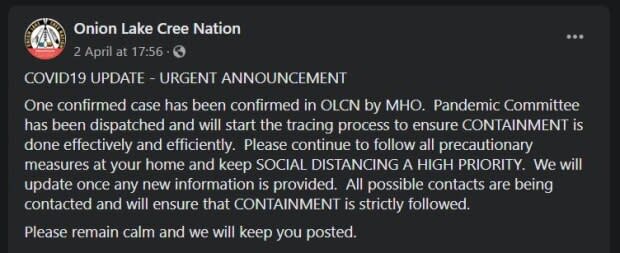Onion Lake Cree Nation reports first COVID-19 case
The Onion Lake Cree Nation is reporting its first case of COVID-19, the third case of the novel coronavirus on a Saskatchewan reserve.
A Facebook post, shared Thursday afternoon, said the case at the First Nation located north of Lloydminster near the Alberta-Saskatchewan border was confirmed by a medical health officer.
"Pandemic Committee has been dispatched and will start the tracing process to ensure the containment is done effectively and efficiently," the post said.
The band office and the community's health director were emailed, asking for confirmation of the case. Health director Albert Jimmy referred CBC News to Indigenous Services Canada.

Indigenous Services Canada regional medical health officer Dr. Ibrahim Khan said Sunday he wouldn't identify which community, citing privacy, but said there is a new case in Saskatchewan's northwest region that was confirmed last week.
"Initially there were two cases in the north, they were actively managed and followed up; they're all back.... They didn't require any hospitalizations," Khan said.
Khan said this new, third case is currently in stable condition and at home. They had eight reported close contacts with people who have been followed up with and are now being monitored.
So far, the investigation has identified it as a case of community transmission that happened outside Onion Lake Cree Nation. The investigation is still underway.
Community measures in place
The band's website has a number of updates and news releases that show a variety of efforts undertaken by the community to try to prevent COVID-19 from spreading.
The community locked itself down, starting Friday, until chief and council determine it is safe to lift the order. A curfew has been in place since March 25, from 10 p.m. to 6 a.m.
An update shared on Friday said multiple checkpoints have been established at entrances to Onion Lake, where people will be asked about their business in the community and screened for COVID-19 symptoms.
Vehicles leaving will be restricted to a maximum of two people.
Non-essential travel has been prohibited and non-band members are prohibited from entering the community.
People who travel to "hot spots" like Edmonton or Saskatoon will be required to self-quarantine for 10 days after they return, and a monitoring system is in place to ensure compliance.
On a voluntary basis, members of the Onion Lake Cree Nation can use colour-coded cards to make other community members aware of the health situation in their homes and whether they need any other help.
Khan said he supports First Nation communities as they attempt to stop the virus and said the federal government had announced financial support to bands for health measures.
A community lockdown is no guarantee a positive COVID-19 case won't be found there, he said.
He said tracking people will help, while noting the other steps that need to be taken.
"In the community and in every family, there has to be steps taken that you don't congregate; no sick people, with respiratory symptoms, roaming around inside the community;… frequently wash your hands; do not touch your face; and if you're sick, stay home, stay away from vulnerable people."

